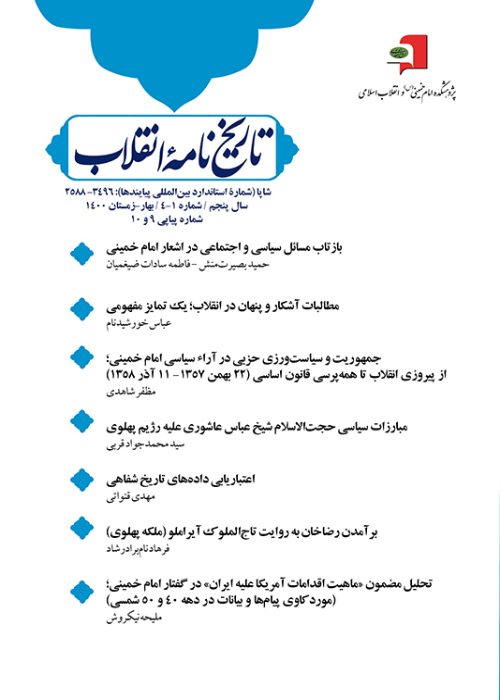Gender Discourse from White Revolution to Islamic Revolution
Author(s):
Abstract:
The quality and quantity of women’s participation in decisive and historic events, such as the revolutions, has not been identical. It has taken different forms depending upon the social and cultural conditions and situations. At the same time, women’s participation has brought gender type into the political conflicts and decision-making process.The Islamic Revolution, that is the most important event determining the political and social fate of the Iranian nation, is no exception to this rule. This is because only 15 years after granting women the right to vote in the context of the reformation plan of White Revolution, Mohammad Reza Pahlavi experie nced the ire and objection of the Ulema upon redefinition of the women’s roles by his government. Massive participation of the women in revolutionary developments with an imagequite different from the commonly accepted traditional or modern model of women in Iran attracted the attention of the foreign observers so that they termed it the“revolution of chadors”. The whys and wherefores behind contribution of women in revolutionarydevelopments are among the less attended areas in the theoretical and research studies on history of the Islamic Revolution. Therefore, this paper intends to show how gender, as a discourse construction, has managed to emerge high within two decades before the victory of Islamic Revolution in the light of linguistic capacities, power concepts and implied resistance, amidst political and social incidents and the usual determining frontiers of man/woman identity factors. To do this based on a discourse analysis method, this paper has focused on official documents produced by political elite and Iranian press in between the years 1963-1978. To that end, wewill picture a historical platform in which the signified man/woman emerges gradually from thousands of years old status to find a new meaning and structure in connection with central signifiers of current rivals’ discourse amidst political clashes including official discourse of the government, traditional clericalism, religious and revolutionary intellectualism.
Keywords:
Language:
Persian
Published:
Journal of Tarikhname-Ye Enghelab, Volume:1 Issue: 1, 2015
Page:
113
magiran.com/p1417756
دانلود و مطالعه متن این مقاله با یکی از روشهای زیر امکان پذیر است:
اشتراک شخصی
با عضویت و پرداخت آنلاین حق اشتراک یکساله به مبلغ 1,390,000ريال میتوانید 70 عنوان مطلب دانلود کنید!
اشتراک سازمانی
به کتابخانه دانشگاه یا محل کار خود پیشنهاد کنید تا اشتراک سازمانی این پایگاه را برای دسترسی نامحدود همه کاربران به متن مطالب تهیه نمایند!
توجه!
- حق عضویت دریافتی صرف حمایت از نشریات عضو و نگهداری، تکمیل و توسعه مگیران میشود.
- پرداخت حق اشتراک و دانلود مقالات اجازه بازنشر آن در سایر رسانههای چاپی و دیجیتال را به کاربر نمیدهد.
In order to view content subscription is required
Personal subscription
Subscribe magiran.com for 70 € euros via PayPal and download 70 articles during a year.
Organization subscription
Please contact us to subscribe your university or library for unlimited access!


